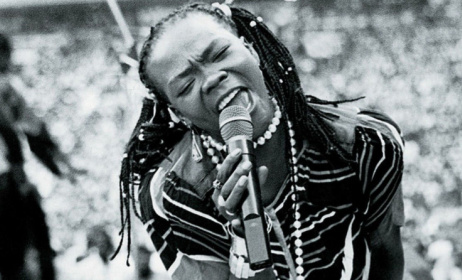Legends Of SA Music: Brenda Fassie
Brenda Lee sung country songs in the 1960s and was one of the earliest pop stars to have a major international following. Her records found their way into the home of Sarah and Mangaliso Fassie, who lived with their nine children in the Cape Town township of Langa. Mangaliso passed away, leaving Sarah to raise all their offspring. Among her children was Lee's namesake, a child who would grow to become admired in millions of African households.
Long before South African townships upheld Nokuzola Brenda Fassie as their cultural ambassador in the 1980s, she was at four years old already singing along to her mother's piano playing in church. Her siblings were also musically inclined. At 11, Brenda was singing in a local band called Cosmos, with her brother on piano. Her first encounter with Johannesburg was as part of Gibson Kente's touring theatre. She'd returned to Langa briefly before finally departing in pursuit of fame. Soul stars Blondie and Pappa Makhene took her on tour in the early 80s as part of their band, The Family. In an interview with the Mail & Guardian, Blondie later remembered visiting producer Koloi Lebona's home, where Brenda was living at the time: "I went to Bra Kara’s [Lebona’s] home with the aim of recruiting her into our band. She was barefoot, unkempt and her front teeth were missing. But when she started singing, her voice was out of this world” .
The Family changed its name to The Big Dudes and Brenda took charge of vocal duties. ‘Weekend Special’, a township anthem considered her breakout hit, was first released as a maxi-single in 1983 and as a full-length album a year later. At a 1984 event organised to celebrate the album's platinum status (at that time, 50 000 copies sold), Brenda's mother Sarah was the special guest. That night, Brenda and The Big Dudes launched their new album, Cool Spot. Meanwhile, Weekend Special achieved success overseas, enabling Brenda to tour Europe, the USA and South America. Success had arrived. In a 1984 profile by Bona magazine, Brenda is quoted as saying: "Now that I have reached this stage in my career, I am not going to turn back. My ambition is to become the number one musician in this country and – well, make a lot of money!"
That she did, although she also made a lot of mistakes that saw her going in and out of debt over a career spanning close to two decades. She lost managers, got sued by promoters for not pitching up at shows and struggled to control a public image that was defined by tabloids. It didn't help that she revelled in the public attention. Meanwhile, her music was served as a side-dish to a main course of salacious details - some concocted, some real. Her performance prowess was seldom written about with the fervour it deserved, nor was the uniqueness of her voice, her ability to fit comfortably into whichever genre she attempted, including bubblegum, R&B and kwaito. Brenda’s music addressed uniquely South African themes. She loved people, and people loved her back. Max Mojapelo, a veteran radio presenter, remembers her as being "easy to talk to, but tricky to manage in an interview".
Following Cool Spot, Brenda and Big Dudes released hit albums like Touch Somebody (1985) and No! No! Senor (1986). Towards the end of the decade she parted ways with the Dudes and teamed up with producer Sello ‘Chicco’ Twala, releasing albums such as Too Late For Mama (1989), Black President (1990), I Am Not A Bad Girl (1991) and Abantu Bayakhuluma (1994). Her 1997 album Memeza remains one of the biggest-selling in South Africa.
Brenda passed away in May 2004, mourned by a nation. True to her legacy - a mix of myth and actuality - the cause of her death was officially stated as asthma, while other reports speculated that it was due to a drug overdose. Speaking after her passing, Chicco explained: "I tried everything in my power to make her life harmonious, but I failed. We spoilt her. She was allowed to waste her money."
She may be gone, but MaBrr’s music and spirit live on!




























Comments
Log in or register to post comments